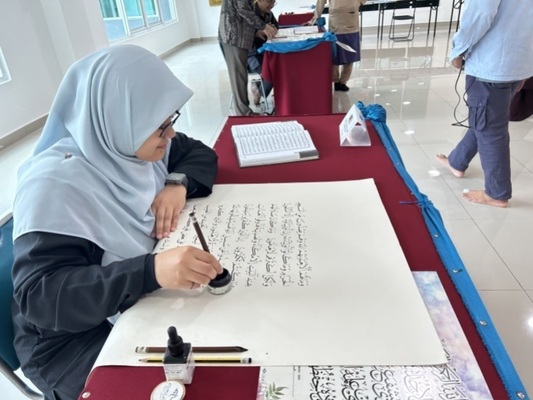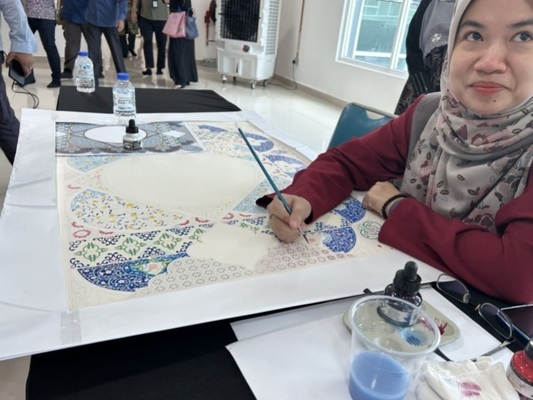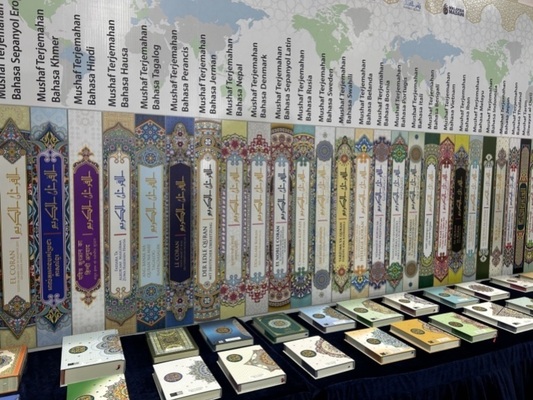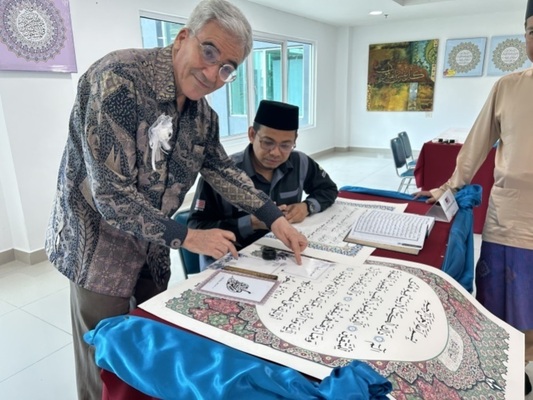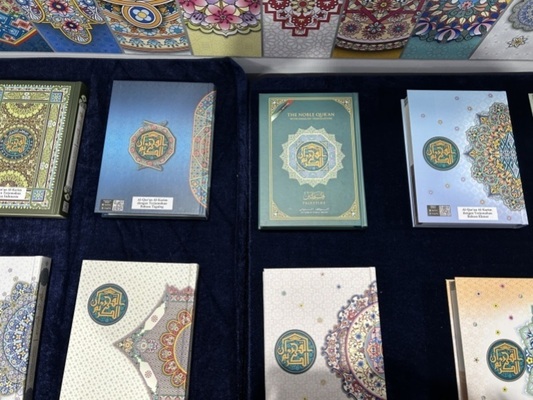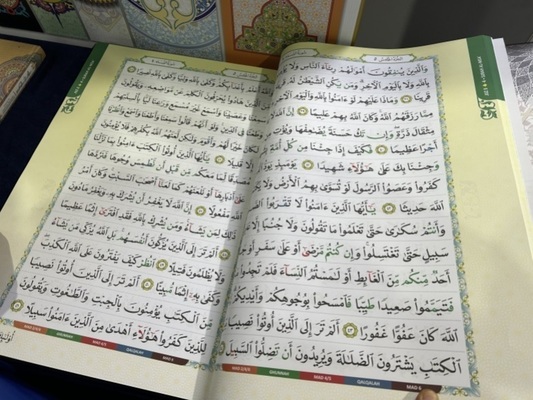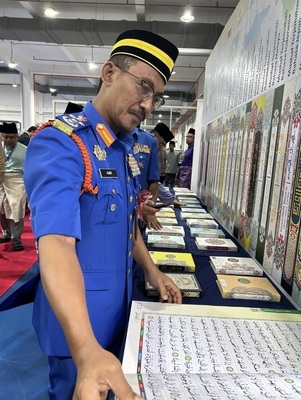Egyptian Quran Master Announces Completion of ‘Mushaf Al-Ummah’
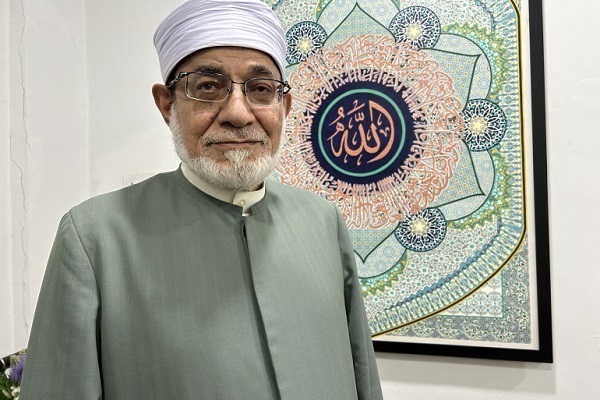
The project included recording the recitation of the Holy Quran according to the readings and narrations known to scholars, and most importantly, a combination of a paper and electronic copy of the entire Holy Quran called Mushaf Al-Ummah.
Al-Maasrawi, formerly the Grand Sheikh of Quraa in Egypt, completed the recording of the recitation a few weeks ago and has begun working with the Restu Foundation to upload it to electronic applications, where Quran reciters can listen to their preferred narration.
Al-Maasrawi adapted and developed this project after eight years of effort in Malaysia, from a similar project in Pakistan in which he himself participated, and this is the first time that the Holy Quran has been recorded in Malaysia with a single voice according to all known narrations.
Al-Maasrawi is a professor at Al-Azhar Islamic University and the former head of the Al-Azhar Quran Committee.
In an interview with Al Jazeera, he spoke about his dreams of living a lifetime with the Quran. Following are excerpts from the interview:
Q: Please tell us about yourself.
A: My life began in a village in Dakahlia (Egypt), where I memorized the Quran at the age of 10. Then I joined the Quran Recitation Institute in Shibra and received the highest academic degree there, specializing in Quran recitation. After that, I received a higher degree in Arabic and Islamic studies from Al-Azhar University, followed by a master’s degree and a doctorate in Hadith.
Q: What made you turn to the science of Qaraat (recitation)?
A: I learned the science of recitation systematically and academically from university professors. The science of recitation is a unique and rare science that only a few people are masters of. Therefore, I preferred to study this science with all its branches, because it is not limited to the science of recitation, but is also related to the science of writing the Quran and its punctuation, and various other sciences such as Waqf and Ibtida.
These are many sciences that only experts know and few are experts in this field.
Q: Now that you are residing in Malaysia, what Quranic activities would you like to do?
A: I studied at the Institute of Quranic Recitations at Al-Azhar and I noticed that there were many Malaysian students studying at the institute. In fact, Malaysian students were the largest group of foreign students sent there.
I first came to Malaysia in 1979 and have been to the country many times since then. I have visited several Quranic institutes in Malaysia. Malaysia’s interest in Quranic recitation is very old, it is not new.
Read More:
Hence, I realized that the Malaysian people, especially students interested in this, need someone to help them and hold their hand to spread this science among them and to be at a high level of skill and mastery.
Q: What is your personal project?
A: The personal project that I have here with Professor Abdul Latif Mirasa, the owner of the Quran Publishing Complex known as the Restu Foundation, is that we signed a memorandum of understanding to create a project for Quranic recitations called ‘Mushaf Al-Ummah’ (The Quran of the Muslim Nation), which includes the ten recitations. Malaysian students need this knowledge, because they study in Egypt and some countries like Saudi Arabia and then return to their countries to teach among Malaysian students.
If this becomes popular among Malaysian students, their knowledge and mastery of the science they have, especially if it is written and scientific, will increase.
Mushaf Al-Ummah is a unique project. The Restu Foundation publishes numerous copies of the Quran, but many narrations, such as the narration of al-Susi from Abu Amr, the narration of Hisham from Ibn Amr, the narration of al-Duri from Ibn Hashim, the narration of al-Duri from Kasa’i, and the narration of Khalaf from Hamza, were not available. If they were, they were scattered in different countries and have not received much attention.
I found that the Malaysian Quran Printing and Publishing Complex was very interested in this issue, especially since it had capabilities that many Quran printing houses did not have. I traveled a lot and visited many Quran printing houses, but I did not find a complex or printing house of this size.
Q: What I understand from what you said is that there is a merger between the printed and electronic versions of the Quran in your plan. Could you please clarify this for us?
A: In fact, the idea of recording narrations and uploading their audio files on the printed version of the Quran was first proposed in Pakistan. I was supervising this project in 2016, which led me to record it with my own voice.
I am not criticizing anyone, but not everyone is equal in reciting and correcting the Quran. I was the supervisor of this at the University of Lahore and several copies of it were printed on behalf of Kuwait.
But as a complete and integrated project with a single audio, it didn’t happen. So I decided to start this project and I started recording the Quran narrations in Malaysia in 2018 and I finished it a while ago. Alhamdulillah the recording process took eight years.
Q: We know the seven and ten recitations… but where did the twenty recitation come from?
A: Recitation is one thing and narration is another. Recitation is attributed to a leader, as we have heard about the recitation of Imam Nafi, the narration of Qalun or Warsh. So the recitation is specific to the leader, but the narration is attributed to his student. So we say: Hafs' narration from Asim; that is, the recitation is for Imam Asim and the narration is for Hafs, who is his student.
Q: What is meant by “the Quran of the Ummah” here?
A: It means a Quran for the entire Muslim Ummah.
Q: What about other versions of the Quran? Aren’t they for the Muslim Ummah?
A: This is just a name. Every project has a name, and anyone can choose any name they like: Mushaf al-Ummah (Quran of the Nation), Mushaf al-Hufaz (Quran of the Memorizers), Mushaf al-Faezeen (Quran of the Chosen), or Quran Majid. These are multiple names. I have agreed with the officials of the Restu Foundation that this recording will be called ‘Mushaf al-Ummah: A Comprehensive Collection of 10 Readings’.
Read More:
Alhamdulillah, the most skilled calligraphers were chosen to write this Mushaf, the most skilled of whom is Abdul Baqi, who, Alhamdulillah, wrote this Quran.
Q: Why do we rely on calligraphers when we have advanced technologies in electronic printing?
A: Technology has its limitations. Printing is done based on copies of the calligraphers’ handwriting. Computers can only produce fonts based on what the calligraphers wrote, unless it is a regular font. People are used to seeing the Quran in a beautiful way, and calligraphy can only be beautiful if it is written by a calligrapher.
Q: Is there a transition from paper Quran to digital Quran?
A: Digital Quran includes manuscript and electronic versions. However, there is a significant difference between a beautiful manuscript with 100% correct punctuation and an electronic version. For example, if we use a mobile phone and open the Mushaf Medina application, this Quran is taken from the original Medina manuscript.
Q: I would like to ask about the nature of the project implementation. Is this Mushaf in Tajweed or Tarteel?
A: Tajweed and Tarteel are one and the same, because God said: “And recite the Quran with Tarteel.” However, Tarteel is known in the present era as fluent recitation, meaning that the reciter, as we hear from Sheikh Abdul Basit or Al-Husari, recites what has been read and recognized as the Quran.
But in the case of Tajweed, the one who recites must be proficient in Tajweed. However, nowadays, Majood is someone who recites with a good voice.
Q: You mentioned the Restu Foundation. I would like to conclude with the role of this center in the Mushaf Al-Ummah project.
A: The role entrusted to the Restu Foundation is very important. Neither I nor anyone else can undertake the task of preparing the Mushaf Al-Ummah with ten readings alone. The Restu Foundation can undertake this task because it has many calligraphers, a total of 10, and has numerous manuscripts of the Quran. This made it easier for us to transcribe the narrations onto these manuscripts, which would have taken a long time.
4302893



